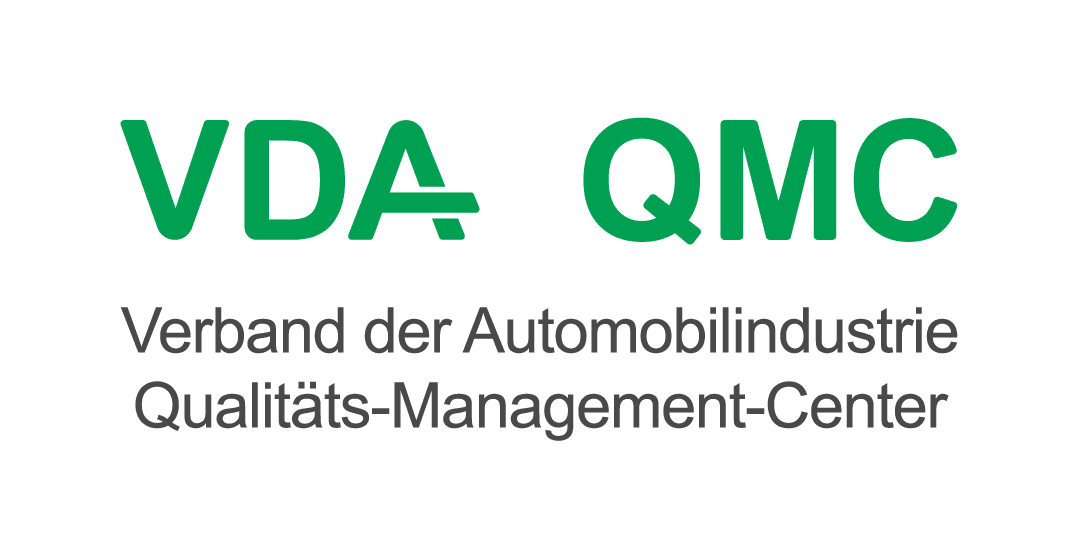

Your qualification is our goal
VDA QMC Inhouse Licence Trainings
INHOUSE TRAINING IN ENGLISH
On request, we offer inhouse training in English. Here you find a list of our standard training courses. If you need more information, please contact us.VDA QMC Training courses
VDA 6.3:2023 – Process Auditor - Qualification
Overview
This training provides you with the basics for performing process audits according to VDA 6.3, considering the process-oriented approach and customer-specific requirements for comprehensive application in the automotive industry.
Target audience
Prerequisites for participation
Targeted Qualification – internal process auditor:
Objectives
Concept and Methods
This training alternates between technical presentations, practical exercises, and case studies in order to support the transfer of what has been learned into your own working practice. Special emphasis is placed on opportunities to exchange experiences.
Accompanying Material
VDA Volume 6.3 For the current edition of the VDA 6.3 process audit, a new evaluation and documentation tool has been developed as a web application. Users can obtain the VDA 6.3 Analysis Tool from the VDA QMC webshop: www.webshop-vda.en.
This training provides you with the basics for performing process audits according to VDA 6.3, considering the process-oriented approach and customer-specific requirements for comprehensive application in the automotive industry.
Target audience
- Employees from QM departments who perform process audits in their own organization (internally)
- Employees from QM departments who perform process audits in the supply chain (externally)
- External auditors (deployed as service providers)
Prerequisites for participation
Targeted Qualification – internal process auditor:
- Knowledge of ISO 19011
- Good knowledge of quality tools and methods
- Knowledge of the relevant customer-specific requirements
- Knowledge of the relevant management system requirements (e.g., IATF 16949, ISO 9001, VDA 6.1)
- Product and process-specific knowledge regarding the technology to be audited
- A minimum of 3 years’ professional experience, including at least 1 year of experience in quality-related fields of activity.
- Excellent knowledge of quality tools and methods (e.g., SPC, VDA Volume 5/MSA, FMEA, VDA MLA/APQP, VDA Volume 2/PPAP, 8D Method)
- If required, knowledge regarding software development processes and methods
- Auditor qualifications (conversation management, conflict management, audit procedure)
- Knowledge of the relevant customer-specific requirements
- Knowledge of the relevant management system requirements (e.g., IATF 16949, ISO 9001, VDA 6.1)
- Product and process-specific knowledge regarding the technology to be audited
- A minimum of 5 years’ professional experience, including at least 2 years’ experience in quality-related fields of activity.
Objectives
- You are familiar with the general requirements and fundamental principles of VDA 6.3.
- You know how to use and perform the risk analysis in a technically correct manner.
- You are able to apply the questionnaire in practice using the process elements (P1–P7).
- You know how to identify the relevant risks using the process audit, to point out potentials and ensure a reliable evaluation.
- You are able to obtain and explain a comparable result on the basis of the evaluation system.
- You are able to carry out process audits both internally and on the premises of your suppliers independently and in a technically correct manner.
Concept and Methods
This training alternates between technical presentations, practical exercises, and case studies in order to support the transfer of what has been learned into your own working practice. Special emphasis is placed on opportunities to exchange experiences.
Accompanying Material
VDA Volume 6.3 For the current edition of the VDA 6.3 process audit, a new evaluation and documentation tool has been developed as a web application. Users can obtain the VDA 6.3 Analysis Tool from the VDA QMC webshop: www.webshop-vda.en.
VDA 6.3:2023 – Process Auditor - Examination
Overview
The examination leading to a certificate allows you to have your qualification independently confirmed so that you can meet the requirements of customers or suppliers regarding auditor competence. Your certificate will indicate that as a VDA 6.3 Auditor you are able and authorized to independently conduct process audits both internally and on the premises of your suppliers.
Prerequisites for attandance
copy of your certificate of qualification of the training “VDA 6.3:2023 – Process Auditor – Qualification”
proof of completion of a three-day auditor qualification course based on DIN EN ISO 19011
proof of knowledge of the Automotive Core Tools (ID 415:2022 or ID 417:2019) or two-day training from another provider (since 2019) + Automotive Core Tools Quiz from VDA QMC
proof of a least five years of full-time professional experience at the production company, at least two years in quality-related fields of activity (personal data sheet).
Admission to the exam is only granted after successful review of the application.
Examination
The examination takes place in the form of an audit simulation. The assessment is focused on the performance as an auditor during the simulation. Audit preparation, auditor behavior during the simulation, and debriefing follow-up are evaluated.
The examination consists of:
Certificate
After passing the examination you will receive a certificate with a registered number.
The examination leading to a certificate allows you to have your qualification independently confirmed so that you can meet the requirements of customers or suppliers regarding auditor competence. Your certificate will indicate that as a VDA 6.3 Auditor you are able and authorized to independently conduct process audits both internally and on the premises of your suppliers.
Prerequisites for attandance
Examination
The examination takes place in the form of an audit simulation. The assessment is focused on the performance as an auditor during the simulation. Audit preparation, auditor behavior during the simulation, and debriefing follow-up are evaluated.
The examination consists of:
- a preparation phase (30 minutes)
- an audit simulation (25 minutes)
- a formulation, evaluation and justification of findings (10 minutes)
- an interview (5-10 minutes)
Certificate
After passing the examination you will receive a certificate with a registered number.
Other VDA QMC training courses
On request we offer the following training courses in English:
- From VDA 6.2:2016 to VDA 6.3:2023 – Upgrade (ID 333)
- VDA 6.3 for certified Process-Auditors (ID 341)
- VDA 6.5 – Product Auditor - Qualification (ID 318)
- Automotive Core Tools for Process and System Auditors (ID 417)
- VDA 2 – Production Process and Product Approval (ID 410)
- VDA 5 – Measurement and Test Processes. Suitability, Planning, Management (ID 471)
- FMEA according to AIAG-VDA – Basics (ID 442)
- Special Characteristics in the Product Engineering Process (PEP) (ID 444)
- Problem Solving in 8 Disciplines (8D) with Elements of the Standardized Process for Handling Customer Complaints – Basics (ID 409)
- Problem Solving in 8 Disciplines (8D) with Elements of the Standardized Process for Handling Customer Complaints for Users (ID 419)
- Product Safety & Conformity Representative (PSCR) (ID 503)
- TISAX-Assessment with VDA ISA (ID 510)
- VDA Field Failure Analysis – User Training (ID 632)
